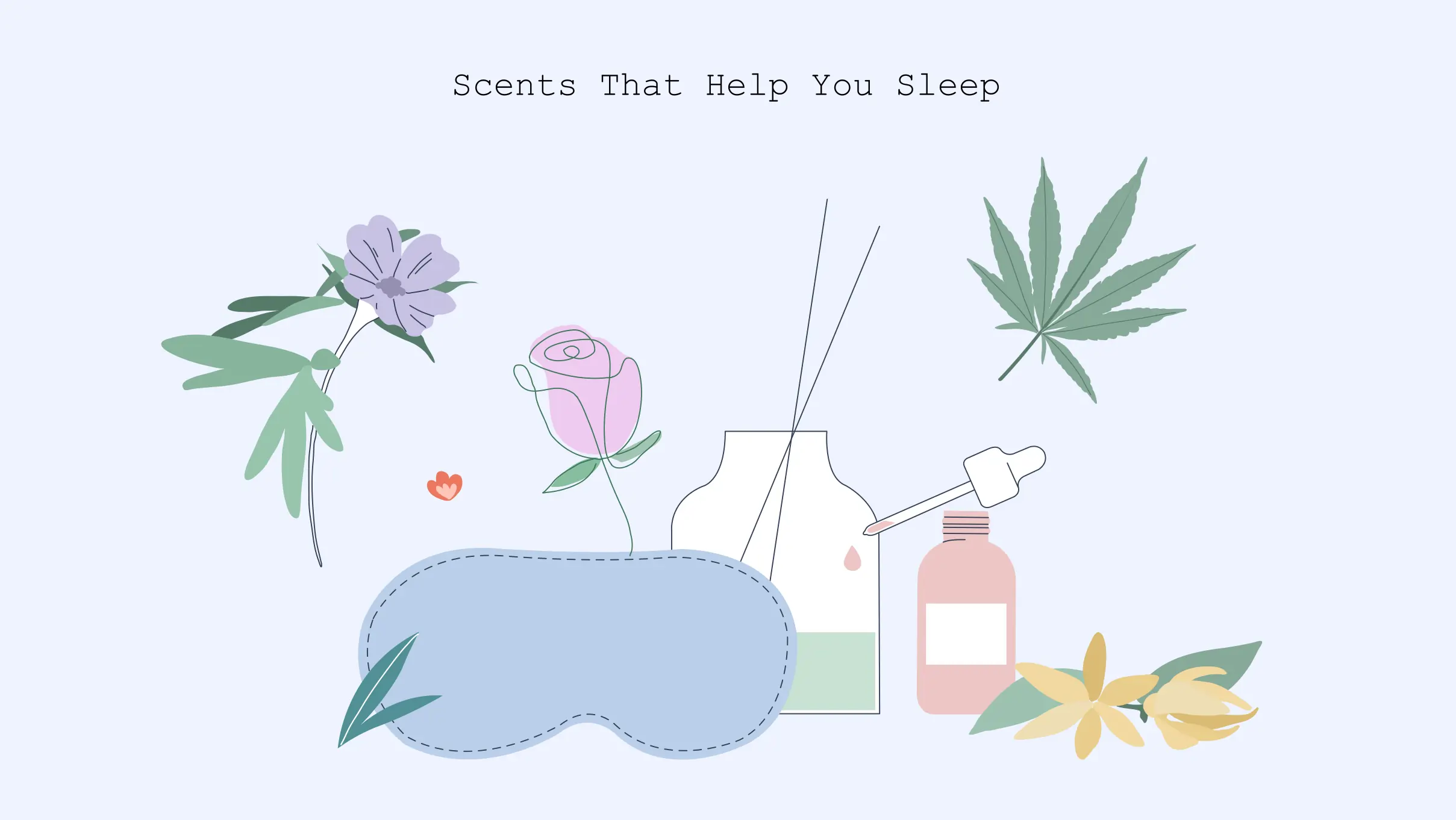10 Best Scents to Help You Sleep
Written by


All our senses are deeply connected to our sleep. A quiet, dark ambience helps us to fall asleep easier. But, if you’re still unable to sleep properly in a perfect atmosphere, you may need sleep scents. In case you don’t know, there are scents that help you sleep, which are also known as natural aromas.
Inhaling essential oils can stimulate the olfactory system in the brain. This sends a message to the limbic system, which is involved in our behavioural and emotional responses. Chemicals are released as a result which makes the person feel calm.
Whether you’re having recent lousy sleep issues or suffering from long-term insomnia, these calming fragrances can help you with quality sleep.
Here are the 10 best scents to help you sleep.
Lavender
Lavender is an excellent fragrance that promotes sleep and cures insomnia. It is one of the widely researched scents for sleep with a calming effect. Moreover, it’s a natural remedy to control anxiety and body aches. For all these reasons, you can try aromatherapy with lavender oil if you’re suffering from a lack of sleep. Originating from the Mediterranean region, this plant is nowadays quite popular across the globe. And so you can easily find lavender flowers, sachets, essential oils and candles with lavender oil.
Jasmine
Jasmine is known for its sweet floral smell that lingers everywhere around the plant. The scent of jasmine can not only boost your performance during the day but can also help you to get better restful sleep at night. If you’re looking for a traditional floral scent to promote sleep and love the smell of jasmine, look no further. You can add a jasmine plant to your bedroom or simply use the flowers for decoration. A few drops of jasmine oil on the pillow also sounds excellent.
Rose
Rose is a scent that can help you relieve anxiety and stress, which are the most common reasons for lack of sleep. The petals of a rose contain ethyl acetate, which has a hypnotic effect when you smell the flower. Also, rose’s anxiolytic substances and flavonoids can provide a night of sound sleep. You can either decorate your bedroom with a batch of rose flowers or add a few drops of rose essential oil to your sheet.
Cedar Extract
Cedarwood extract works as a sedative and provides the users with calmness. It can induce proper sleep if you apply a few drops of oil behind your ears or on your pillow. Cedar essential oil is known for its wound-healing properties and can relieve older people with joint pain. The scent of cedar extract is woody with a mild touch of citrus flavour. If you like the smell, you can opt for cedar extract to ensure a night of sound sleep.
Ylang-Ylang
Ylang-Ylang is the extract of the Cananga tree, which originated in Asian countries. Today, essential oil is available all over the world and can be used to promote better sleep. Ylang-Ylyang scent is a natural healer which reduces the body’s heart rate and blood pressure level. As a result, the scent can prepare you for bedtime within a few minutes. Many people love the fruity scent, and if you like it too, you can try Ylang-Ylang extract or oil as a sleep inducer.
Cannabis
Cannabis has calming properties, which can help you with a sound sleep. Though there’s a long debate among health experts regarding the adverse effects of cannabis smoking, cannabis oil is safe in a small amount. CBD oil is a natural ailment of pain, stress and anxiety, often leading to sleeplessness or disturbed sleep. You can add a drop of cannabis oil to your sheet or pillow to ensure sound sleep. But, too much cannabis oil can lead to fatigue or diarrhoea.
Bergamot
Though bergamot orange originates from Italy’s Calabria region, the plant is today found in many countries. And the extracted oil from the fruit’s peels works as a natural remedy for better sleep. The essential oil is quite popular in the pharmaceutical, perfume and food industries owing to the sweet citrus scent. The oil is an excellent choice for improving mood and thereby falling asleep faster. The oil also helps the users to reduce their levels of anxiety and stress in mind.
Clary Sage
The extract of the clary sage plant, also known as clary sage essential oil, has antidepressant effects. Inhaling clary sage essential oil can promote better sleep by reducing the cortisol levels in your body. To create a peaceful and relaxing environment in your bedroom, you can apply one or two drops of oil to your sheet or pillow. The smell of the oil is a combination of floral and earthy, which many perfume enthusiasts love.
Roman Chamomile
Roman chamomile is one of the best calming scents available, and you can try its essential oil to get proper sleep. A study has been conducted on older people suffering from a consecutive lack of sleep. Applying two drops of oil to their pillows has improved the total time of their sleep. Non-dementia patients had the largest increase in sleep in the study period — 89-100.5 periods of sleep (p=0.005). Followed by patients on acute medical and psychiatric functional and organic assessment wards — 87.6-97.9 periods of sleep (p=0.005).
Chamomile tea is also a popular drink for people to improve their sleep and quality. Another way to use chamomile is by lighting chamomile-scented candles before sleep.
Geranium
This South African shrub is famous worldwide for its sweet, floral aroma. Geranium extract has been widely used in soaps and perfumes manufacturing industries. The smell of geranium is similar to rose with a slight difference. Inhaling the scent of geranium from its essential oil can reduce your depression and anxiety, leading to a peaceful night’s sleep. Geranium essential oil is also known for its anti-inflammatory and sedative properties.
Aromatherapy
Aromatherapy is a popular healing method using essential oils and other natural scents extracted from plants and herbs. Aromatherapy aims to heal the body and mind, improving overall physical and mental health. The therapy usually follows a topical application of inhaling the relaxing smells. Some examples of aromatherapy are steam baths, essential oil massage with carrier oil, dropping essential oils in pillows or outfits, etc.
Most of us deal with body aches, mood swings, depression, anxiety, lack of sleep, headache, and skin problems. These issues tend to increase as we grow older. In such cases, aromatherapy can be the best natural method to control and reduce the symptoms. A healing massage or a steam bath can cure all these problems by reaching the root or cause.
Benefits of Aromatherapy
According to WebMD, Here are some benefits that you can get from aromatherapy.
- Promotes sleep time and quality
- Provides relaxation and boosts mood
- Controls depression, stress and anxiety
- Heals joint and muscle pains
- Fights the bacteria in the skin
- Eases side effects of fatal disease treatments like cancer
Side Effects of Aromatherapy
Some people are allergic to certain smells, and aromatherapy isn’t suitable for them. Otherwise, aromatherapy is safe unless you use too much essential oil. Excess use of essential oils can lead to skin rashes, burns, headaches and asthma attacks. Since the oils are very strong, defusing them well with some career oil is the safest way to use them.
How sleep scents work
Sleep scents improve the bedroom environment and prepare it for a perfect sound sleep. You can attain complete calmness as you get exposed to certain smells that are natural healers. If joint pain or anxiety keeps you awake for days, sleep scents can reduce these conditions and help you to relax. As a result, the soothing effect of the scents and the positive mood can put you to sleep for a longer hour.
Can Certain Smells Help With Sleep?
Yes, definitely! The smells that we’ve mentioned above can help you to get proper sleep. Smells are deeply connected to our moods and reactions. Smells can have a significant impact on our physiological and psychological responses. Certain smells such as citrus, cinnamon and eucalyptus have energising effects, and they aren’t suitable for a sleeping environment. In contrast, lavender, rose, chamomile and all the above scents have calming properties, leading to better sleep.
Most of the scents we’ve mentioned above are available as essential oils for sleep. You can buy them easily and apply a few drops on the pillow or sheet before you go to bed. But, make sure you never use more than two drops of the oils as the scents are quite strong.
Conclusion
Is there a scent that makes you sleepy? Yes, there are many. They are also known as bedtime scents. These scents can improve your sleep quality by calming your mind and body with a fresh and natural aroma. And we’ve mentioned almost all the popular scents that’ll help you get sound sleep.
FAQs
What is the most relaxing scent?
Lavender is the most relaxing scent among all sleeping scents. Jasmine, rose, chamomile, bergamot and clary sage are also quite relaxing.
Does the scent of vanilla help you sleep?
Yes, the scent of vanilla can help you sleep better. The sweet smell works as a natural healer, which also cures stress and anxiety.
Do you put perfume on before bed?
You can put on a relaxing perfume before bed if it really improves your sleep. Else, choosing essential oils will be a better idea.
people like this article
Written by








